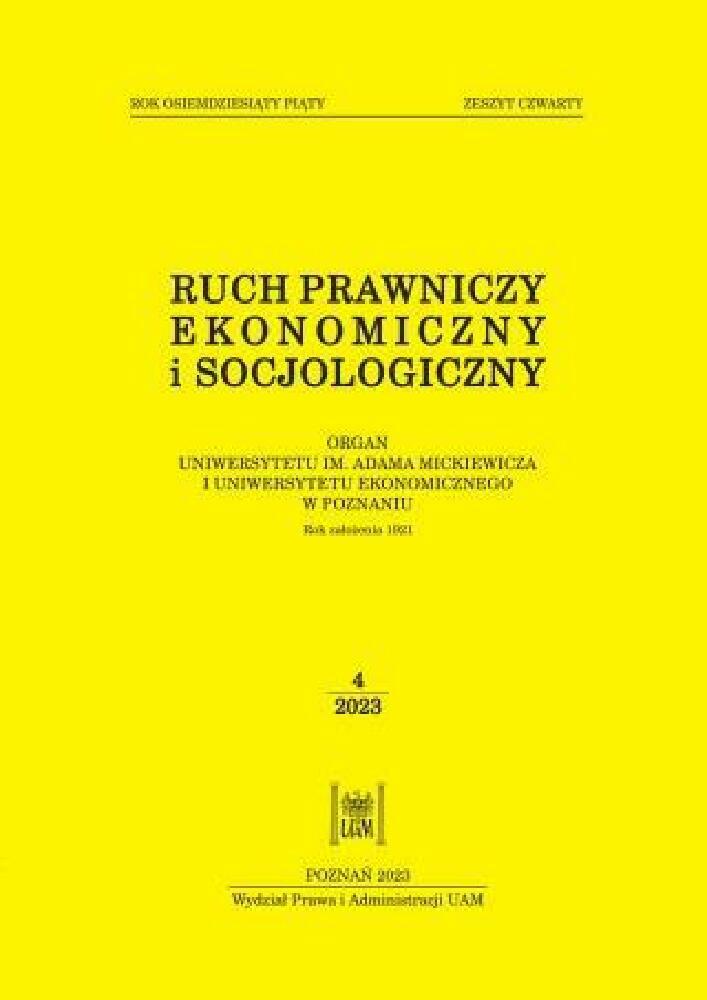Abstrakt
Celem artykułu jest prześledzenie najgłośniejszych w USA propozycji federalnego podatku od bogactwa (wealth tax), a także sporów dotyczących zgodności takiego podatku z amerykańską Konstytucją. Posługując się metodą historyczno-opisową oraz porównawczą, autor analizuje relewantną amerykańską literaturę przedmiotu oraz orzecznictwo Sądu Najwyższego USA, w tym liczne opinie na temat konstytucyjnej klauzuli o „podatkach bezpośrednich”, między innymi ojców założycieli. Jak wynika z przeprowadzonych badań, propozycje podatku od bogactwa, tj. od wartości netto majątku powyżej określonej wartości, są czymś względnie nowym w historii USA. Jak się wydaje, szczególnym tego powodem jest fakt mocno przyspieszonego od lat osiemdziesiątych wzrostu nierówności dochodowych – a co za tym idzie: majątkowych. Koncepcje podatku od bogactwa pojawiają się bowiem zarówno w środowiskach akademickich, jak i wśród polityków – co świadczy o dużej skali problemu nierówności. Zwolennicy podatku wskazują między innymi, że nadmierna koncentracja majątkowa i wynikające z niej nierówności są szkodliwe tak z punktu widzenia polityczno-prawnego, jak i ekonomicznego. Wokół propozycji podatku od bogactwa istnieje jednak wiele wątpliwości. Przede wszystkim w odniesieniu do tego, czy podatek od bogactwa wchodzi w zakres konstytucyjnej klauzuli o „podatkach bezpośrednich”, a zatem czy podlega konieczności „rozdzielenia” jego wysokości pomiędzy stany proporcjonalnie do liczby ich mieszkańców, co znacznie utrudniłoby przyjęcie takiego podatku, a być może wręcz uniemożliwiłoby.
Bibliografia
Ackerman, B. (1999). Taxation and the Constitution. Columbia Law Review 99(1): 1-58. DOI: https://doi.org/10.2307/1123596
Ackerman, B., Alstott, A. (1999). The Stakeholder Society. New Haven, London: Yale University Press.
Bahnsen, D.L. (2020). Elizabeth Warren: How Her Presidency Would Destroy the Middle Class and the American Dream. New York: Post Hill Press.
Brooks, J.R., Gamage, D. (2020, 9 January). Why a Wealth Tax Is Definitely Constitutional. https://scholarship.law.georgetown.edu/cgi/viewcontent.cgi?article=3245&context=facpub DOI: https://doi.org/10.2139/ssrn.3489997
Brooks, J.R., Gamage, D. (2022). Taxation and the Constitution, reconsidered. Tax Law Review 76: 75157. DOI: https://doi.org/10.2139/ssrn.4061257
Corwin, E.S. (1950). Court Over Constitution. New York: New York University Press.
Dodge, J.M. (2013). What federal taxes are subject to the rule of apportionment under the Constitution. University of Pennsylvania Journal of Constitutional Law 11(4): 839–956. https://scholarship.law.upenn.edu/jcl/vol11/iss4/2
Einhorn, R.L. (2006). American Taxation, American Slavery. Chicago: The University of Chicago Press. DOI: https://doi.org/10.7208/chicago/9780226194899.001.0001
Epstein, R.A. (2012, 17 January). Death by wealth tax. https://www.hoover.org/research/death-wealth-tax
Fisher, G.W. (1996). The Worst Tax? A History of Property Tax in America. Lawrence, KS: University Press of Kansas.
Fleischer, M.P. (2017). Not so fast: the hidden difficulties of taxing wealth. W: J. Knight, M. Schwartzberg (eds.), Wealth (s. 261–308). Nomos 58. New York: New York University Press.
Friedman, L.M. (2005). A History of American Law. New York: Touchstone.
Glogower, A. (2020). A constitutional wealth tax. Michigan Law Review 118(5): 718-784. DOI: https://doi.org/10.36644/mlr.118.5.constitutional
Glogower, A., Gamage, D., Richards, K. (2021). Why a federal wealth tax is constitutional. February 2021. https://www.repository.law.indiana.edu/cgi/viewcontent.cgi?article=3960&context=facpub
Holmes, G.K. (1893). The concentration of wealth. Political Science Quarterly 8(4): 589–600. https://www.psqonline.org/article.cfm?IDArticle=685 DOI: https://doi.org/10.2307/2140099
Jensen, E.M. (1999). Taxation and the Constitution: how to read the direct tax clauses. The
Journal of Law & Politics 15(4): 687-715. https://scholarlycommons.law.case.edu/faculty_publications/527
Jensen, E.M. (2005). The Taxing Power: A Reference Guide to the United States Constitution. London: Praeger Publishers.
Johnsen, D., Dellinger, W. (2018). The constitutionality of a national wealth tax. Indiana Law Journal 93(1): 111–137. https://www.repository.law.indiana.edu/ilj/vol93/iss1/8/
Johnson, C. (1998). Apportionment of direct taxes: the foul-up in the core of the Constitution. William and Mary Bill of Rights Journal 7(1): 1-160. https://scholarship.law.wm.edu/wmborj/vol7/iss1/2
Kamin, D. (2013). Reducing poverty, not inequality: what changes in the tax system can achieve. Tax Law Review 66(593): 593–640. https://ssrn.com/abstract=2234519
Kamin, D. (2015). How to tax the rich. Tax Notes 146(1): 119-129. https://ssrn.com/abstract=2550936
Kennon, D.R. (1989). The Committee on Ways and Means: A Bicentennial History 1789-1989. Washington: United States House of Representatives.
Kleinbard, E.D. (2016). We Are Better Than This: How Government Should Spend Our Money. Oxford: Oxford University Press.
Lundberg, F. (1968). The Rich and the Super-Rich. New York: Bantam Books.
McKinnon, R. (2012, 9 January). The conservative case for a wealth tax. Wall Street Journal. https://www.wsj.com/articles/SB10001424052970203462304577139232881346686
Natelson R.G. (2015). What the Constitution means by „duties, imposts, and excises” – and „taxes” (direct or otherwise). Case Western Law Review 66(2): 319-322. https://scholarlycommons.law.case.edu/caselrev/vol66/iss2/4 DOI: https://doi.org/10.2139/ssrn.2572633
Piketty, T. (2015). Kapitał w XXI wieku. Tłum. A. Bilik. Warszawa: Krytyka Polityczna.
Ratner, S. (1967). Taxation and Democracy in America. New York: Science Editions John Wiley & Sons, Inc.
Rybarski, R. (2015). Nauka skarbowości. Warszawa: Wydział Prawa i Administracji Uniwersytetu Warszawskiego.
Saez, E., Zucman, G. (2019). The Triumph of Injustice: How the Rich Dodge Taxes and How to Make Them Pay. New York: W. W. Norton & Company.
Sanders, B. (2017). Our Revolution: A Future to Believe In. London: Profile Books Ltd.
Scheuer, F., Slemrod, J. (2021). Taxing Our Wealth. The Journal of Economic Perspectives 35(1): 207–230. DOI: https://doi.org/10.1257/jep.35.1.207
Schultz, W.J., Harris, C.L. (1965). American Public Finance. Englewood Cliffs. New Jersey: Prentice-Hall.
Seligman, E.R.A. (1895). Essays in Taxation. New York: Macmillan and Co.
Seligman, E.R.A. (1911). The Income Tax: A Study of the History, Theory, and Practice of Income Taxation at Home and Abroad. Clark, NY: The Lawbook Exchange.
Semuels, A. (2016). The feudal origins of America’s most-hated tax. The Atlantic. https://www.theatlantic.com/business/archive/2016/08/the-feudal-history-of-property-tax-in-america/497099/
Shakow, D., Shuldiner, R., (2000). A comprehensive wealth tax. Tax Law Review 53: 499–585. https://scholarship.law.upenn.edu/faculty_scholarship/1264
Skwirowski, P. (2022, 4 sierpnia). Polacy praktycznie bez oszczędności. Ciekawe wyniki badania. Rzeczpospolita. https://pieniadze.rp.pl/budzet-rodzinny/art36811451-polacy-praktycznie-nie-maja-oszczednosci-ciekawe-wyniki-badania [dostęp: 28.03.2023].
Tocqueville, A. de (1996). O demokracji w Ameryce. Tom 1. Tłum. B. Janicka, M. Król. Kraków: Wydawnictwo Znak.
Wallace-Wells, B. (2019, 19 October). The French economist who helped invent Elizabeth Warren’s wealth tax. New Yorker. https://www.newyorker.com/news/the-political-scene/the-french-economist-who-helped-invent-elizabeth-warrens-wealth-tax
Warren, E. (2021). Persist. New York: Metropolitan Books.
Williams, S. (2013, 2 November). America’s 5 Most Hated Taxes. https://www.fool.com/investing/general/2013/11/02/americas-5-most-hated-taxes.aspx
Zucman, G. (2015). The Hidden Wealth of Nations: The Scourge of Tax Havens. Chicago, London: The University of Chicago Press. DOI: https://doi.org/10.7208/chicago/9780226245560.001.0001
Licencja
Prawa autorskie (c) 2023 WPiA UAM

Utwór dostępny jest na licencji Creative Commons Uznanie autorstwa 4.0 Międzynarodowe.





